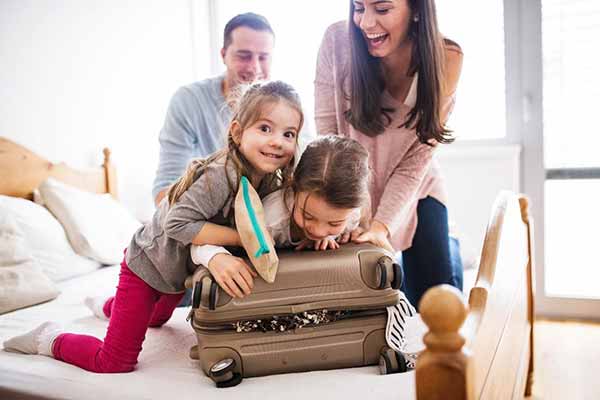The house is abuzz with excitement. The cat’s on edge, someone has lost their passport, and no one can decide if they’ll need two pairs of shoes or three.
Yes, it’s vacation time.
Energy efficiency may not be the highest priority when planning a fun-filled getaway. But these simple energy-saving tips while on vacation will help keep your home and its contents in tip-top form for your return. Think of it this way: You’ll save energy and money, which will help you enjoy your vacay even more.
Why Is Energy-Saving Important While on Vacation?
Energy waste is a massive issue. According to estimates, the United States wasted two-thirds of the country’s energy consumed and paid for in 2018.
It’s easy to become an energy saver whether you’re away for a weekend, a month, or longer. You’ll reduce your energy usage, help combat climate change through energy conservation, and bring your electricity bill down.
You’ll see how easy it is to save on utility bills and perhaps pick up good habits that will continue throughout the year. Read on for our easy-to-adopt energy-saving tips while on vacation.
What’s the Best Thermostat Setting While I’m on Vacation?
The easiest apple to pick from the save energy tree is your heating bill and thermostat setting. Just over half of the average U.S. home’s energy use goes on space heating and air conditioning.
In summer and warm conditions, the Department of Energy (DOE) recommends setting your thermostat to 85-90 degrees Fahrenheit (29.4 to 32.2 Celsius) to reduce cooling costs. In the right conditions, you could even turn it off.
If you leave the thermostat at a higher setting, there’s a risk of humidity affecting electrical equipment, furniture, and wood floors. Temperature-sensitive appliances like refrigerators have to work harder in warmer conditions and will consume more energy.
Meanwhile, you need to guard against freezing pipes in winter conditions. The DOE’s winter vacation thermostat recommendation is 50-55 degrees Fahrenheit (10-12.7 Celsius). While you will still have to pay something towards your heating costs, it’s a lot less than coming home to structural damage.
A programmable thermostat is perfect for this task. You can preset when your heating or cooling system works and even set it to have the house at your preferred temperature for your return.
Smart thermostats go one step further, connecting to an app on your mobile phone. You can set the thermostat temperature when you wish, giving complete control of your HVAC and heating system’s energy consumption.
What to Do With My Water Heating While on Vacation?
Water heating is the second-highest energy user in a home, accounting for 19% of energy consumption.
There are several types of water heaters. In areas with no freezing temperature risk, the best advice for summer vacations is to turn the water heater as low as possible or off. Turn off the cold water supply if you turn it off completely. Keep the water supply open if you keep the water heater working.
The downside is you will return to cold water. When you return, make sure to reopen the cold water supply if necessary and wait for the water heater to provide hot water before opening the hot water faucet.
Most manufacturers recommend setting a water heater to 50 degrees Fahrenheit (10 Celsius) for winter vacations and areas susceptible to freezing temperatures. This protects the pipes from freezing.
Households with a gas water heater can change their setting to “vacation” mode and turn off their cold water supply. On your return, check everything is fine, open the cold water supply, and turn the setting to warm.
People with pools should reduce pool pump running time, and spa owners can lower or turn off the heater.
Enter your ZIP Code and compare electricity rates
Should I Turn All My House Lights off While on Vacation?
“Don’t forget. Last one out, turn the lights off.” It’s a wise refrain, but when you consider a home’s lighting accounts for 5% of its total energy use, and 15% of its electricity use, there’s perhaps a little more to do.
Remembering to turn the lights off when you go on holiday is good advice. However, from a security viewpoint, it’s also good advice to use timers or programmable smart light bulbs to turn a few lights on at various times in the evening. That way, it always looks like someone is home.
Light bulbs give out heat as well as energy. Make sure your timers turn on energy-efficient light-emitting diode (LED) lights rather than older bulbs.
Halogen or incandescent light bulbs only convert around 5% of their electricity into light. Your vacation will give you the perfect opportunity to conduct an audit of your light bulbs before you head out.
Compact fluorescent lights (CFLs) and LEDs last up to 25 times longer than incandescent light bulbs and use 25-80% less energy, too. Here are their average lifetimes:
- Traditional halogen light bulb: 1,000 hours.
- Energy-saving incandescent bulb: between 1,000-3,000 hours.
- LED light bulbs: 25,000 hours.
- Compact fluorescent light bulb (CFL): 10,000 hours.
Energy Star-certified products meet strict energy efficiency guidelines set by the U.S. Environmental Protection Agency. One Energy Star-approved LED light bulb can save you $55 over its lifetime.
If you use timers to turn on your lights while on vacation, your home will warm, especially if you use less energy-efficient light bulbs. Your air conditioner unit will kick in more often, wasting more energy. LED bulbs emit 70-90% less heat than halogen light bulbs and use less energy.
Should I Turn My Refrigerator Off When I Go On Vacation?
Appliances can burn through energy while you are on vacation — refrigerators account for 3% of a home’s total energy use.
Ensure the refrigerator compartment is set between 36-40 degrees Fahrenheit (2.2-4.4 Celsius and two-thirds to three-quarters full at all times. You are going on vacation, so chances are the refrigerator won’t be fully stocked; you can fill it with jugs or bottles of water. Cold items help to keep the temperature down inside the refrigerator, so you use less energy.
The freezer compartment is usually set between -5 and 0 degrees Fahrenheit (-17.7 to -20 Celsius). You should be able to change this to 5 degrees Fahrenheit (-15 Celsius). You may need an appliance thermometer to help measure the internal temperatures.
If you are away for a very long time, consider turning the refrigerator off completely. (Just be sure to remove all the food items first!)
Why Should I Unplug Everything Before I Go On Vacation?
We can answer that question with another question: Did you know that appliances left plugged in cost U.S. bill payers about $11 billion every year? Yes, it’s true.
Unplugging appliances means all those little standby lights are not burning energy while you are away, known as ‘phantom energy.’ Power strips are great for plugging in multiple appliances and turning them all off in one fell swoop.
Even better is to unplug as many appliances as you can, from clothes washers to chargers to televisions. Unplugged items also mean less fire risk and more protection from power surges during outages or storms.
Any More Energy-Saving Tips Before Going on Vacation?
Yes, we have more energy-saving tips while on vacation.
Draw curtains and lower blinds, be it a summer or winter vacation. In summer, direct sunlight shining through windows will heat your home, the hot air sure to kick your air conditioner into action.
In winter, the curtains and blinds prevent heat loss by insulating the windows, keeping warm air in and cold air out. Your heating system will need to work less, saving energy.
And don’t forget to look up. It’s easy to leave home with the ceiling fans still whirling.
What Day-to-Day Energy-Savings Tips Can I Adopt?
Adopting the above practices into your pre-vacation routine will save you energy and money. The small effort and audit required will make you look at your home more carefully and perhaps reveal some structural issues.
What if you made these self-made energy-saving rebates a more permanent part of your life? Or perhaps you are going away on a very long trip and need to make sure the house is watertight?
There are lots of energy-saving tips and home improvements that can change your relationship with your energy bills. Some involve a relatively low cost for a high payback and just a little bit of DIY.
What Are Some Quick Energy-Saving Fixes for Windows?
Air leaks in windows and doors are easily fixed; insulating your home is essential to keeping it cool in summer and warm in winter.
Check windows and doors for any airflows. Block these with weather stripping or caulk to immediately have more efficient windows. Caulking is a fairly straightforward DIY task within the capabilities of most people.
Consider fitting storm windows to provide more insulation, too.
How Can I Save Energy in the Laundry Room?
Everyone loves the smell of freshly washed clothes. Washing machines use gallons of water, so make sure you wash only full loads and lower temperatures. Around 90% of a washer’s energy heats the water. And you’ll have plenty of laundry after returning from vacation.
Check washers and dryers for dirty filters and clean them — cleaning the filters of lint will make the machines more efficient.
People with outside space (and suitable weather) can air-dry clothes rather than using the dryer, another great way to save energy.
Three final tips which could help reduce energy bills are:
- Use a toaster oven for smaller dishes and reheating. Toaster ovens use a lot less energy than a full-size oven.
- Make sure your HVAC’s air filters are clean and obstruction-free.
- Fit a low-flow showerhead — it will save many gallons of water over the year and the cost of heating that water.
Enjoy Your Getaway With Our Energy-Saving Tips While on Vacation
The most important part of this guide is that most of these ideas are relatively easy to do before going away. Use our energy-saving tips while on vacation to save money — and perhaps you’ll be able to save up for another trip away more quickly.
When you start packing your bags, you can put on Frank Sinatra and sing along. “Yes, it’s nice to go traveling, but it’s oh so nice to wander back … to a cozy home that’s been energy-efficient and saved money on your energy bill while you’ve been away.” *
* The lyrics may have been changed just a bit. Sorry, couldn’t resist.
Brought to you by energysavings.com
All images licensed from Adobe Stock.
Featured image:




